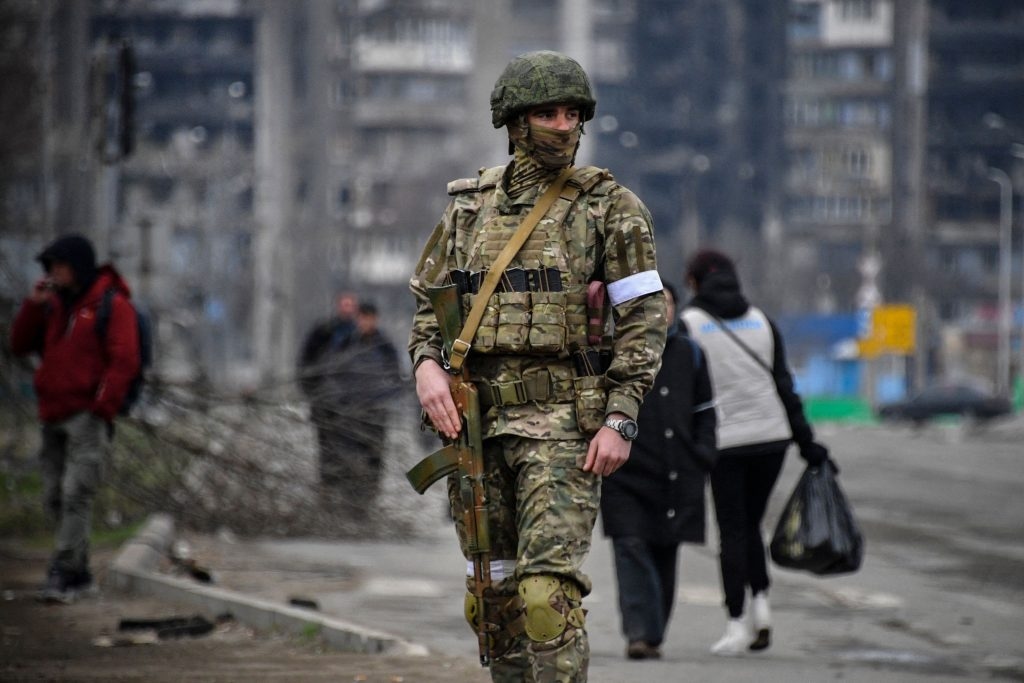‘Hide the girls’: How Russian soldiers rape and torture Ukrainians

BUCHA, Kyiv Oblast – A week before she would have turned 23, Karina Yershova was killed by Russian soldiers in Bucha, a town outside Kyiv.
They tortured her and most likely raped her, Karina’s stepfather Andriy Dereko told the Kyiv Independent. Then, they shot her in the head.
“It was clear that they (police) know she was raped as she was tortured, but the detective would not tell us this up front. She said: ‘I have no moral right to tell you’…But hinted at (rape),” Dereko said.
According to Dereko, his stepdaughter was a petite woman who worked as a manager at a local sushi bar and didn’t pose any threat to anyone.
The police did not show Karina’s body to her parents, saying it would be too shocking to see. She was buried in a closed coffin on April 13 in Bila Tserkva in Kyiv Oblast, a day after being identified.
Since the Russian soldiers withdrew from Kyiv Oblast in early April, authorities have been collecting and exhuming the bodies of civilians slaughtered by Russians during the one-month occupation. In Bucha only, they have discovered over 400 bodies of murdered civilians. Russians killed every fifth resident who remained in the city, according to Bucha Mayor Anatoliy Fedoruk.
The exhumations and the testimonies of surviving locals have shed light on another Russian atrocity: mass rape of Ukrainians, including women, men, and children.
Multiple cases of rape in Bucha have been reported by lawyers, psychotherapists, and authorities. According to Ombudsman Lyudmila Denisova, 25 girls and women aged 14-24 were held captive in one basement in Bucha and were repeatedly raped by a group of Russian soldiers.
Dereko asked the detectives to at least let him see the photos of his stepdaughter’s dead body. He was shown Karina’s upper body only. What he saw was terrifying.
“There were cuts and lacerations, there was also a piece of flesh torn off from her ribs,” he said. “It’s obvious they tortured her.”
The police told Dereko that Karina’s leg had also been shot. She apparently tried to stop the bleeding with a tourniquet.
He suspects Karina tried to defend herself, which only further angered the perpetrators.
“Half of her nails were torn off,” Dereko said.

Police told him where his stepdaughter was killed and found: at a house just 1.5 kilometers away from Karina’s place, in the same part of Bucha.
Bucha resident Mykola lives nearby. He told the Kyiv Independent that he knows how Karina died. He asked to be identified by his first name only for safety reasons.
According to him, on March 16, Russian soldiers brought the already wounded Karina to the house of his neighbors, an elderly couple, Viktor and Natalya Mazokha.
“They brought a wounded girl to them. I don't know what happened next, but a soldier unleashed a volley of machine gunfire at the ground, then an officer came and shot all three of them,” Mykola told the Kyiv Independent.
“Three days later a Russian soldier came (to us) and said: ‘There are corpses there.’”
Mykola was unable to immediately bury the dead as snipers were shooting at anyone who was outside.
After a week or two had passed, Russian soldiers returned to Mykola’s home to tell him they had two hours to bury the bodies.
The Kyiv Independent has reconstructed the events leading up to the killing of Karina Yershova.
Haunted by war
Russia’s war first intruded into Karina’s life when she was a teenager.
In 2014, when Russia invaded Ukraine in the east, Karina fled her native Donetsk with her family. They managed to escape and resettled in the quiet suburbs of Kyiv.
Eight years later, Russian troops came there, too. Karina’s parents fled right away. She lived separately and refused to join them.
“We tried to talk her into leaving throughout the entire day on Feb. 24,” Dereko said, recalling the first day of Russia’s full-scale invasion.
She underestimated the risks, Dereko believes: “I can understand her. Who would have thought that those beasts would slaughter regular people?”
Wars are not fought against civilians, but for territories, he thought.
“Here they fought for fridges, for goods, with ordinary people,” Dereko said, referring to Russian soldiers mass looting the homes of Ukrainians.
Russian soldiers destroyed and looted their family’s apartment in Irpin, a city neighboring Bucha, where Karina used to live before moving out and going to Bucha.
They took his stepdaughter’s old iPhone 6, Dereko said.
“If they told me, I would have bought a bag full of those iPhones, only to make sure she stayed alive.”
She used this phone to call her stepdad on March 10, the last time they spoke.
“When we talked for the last time, the Russians warned her against using her phone. They thought she was filming them. She told them: ‘I’m talking to my mom.’”
They made her hang up. Then she called back and said she was alright, Dereko recalls. By then Russian tanks had already been parked near her apartment building, Karina told her stepdad.
Soon Karina stopped replying.

The last time she was seen at home was early March, said Vyacheslav Chumak, her neighbor.
He found her sitting in the stairwell. Karina said she couldn’t enter her apartment as she had no keys. Chumak invited her home.
He and his wife fed Karina and asked her what happened. She told them that Russian soldiers had stopped her on the street during curfew and detained her. She had to stay overnight in their barracks.
“She told us that they had gotten drunk. One of the soldiers had his leg shot near his ass, the other one was run over by a tank or an infantry vehicle, she said,” Karina’s neighbor went on.
In the morning they let her go but took away her phone, Karina told Chumak.
After speaking with her neighbors, Karina fell asleep in their armchair for 10 or 20 minutes, Chumak said, and soon left. She managed to get into her apartment, he said.
In a day or two, a light blue car with the letter “V” – one of the symbols Russian troops put on vehicles in their war against Ukraine – arrived to pick up Karina.
According to Chumak, the driver was an acquaintance of the owner of the apartment Karina rented.
“She packed her bags into this car and waved my wife goodbye,” Chumak said.
“We never saw her again.”
Girls in danger
Across the entire Kyiv Oblast, including Bucha, women were warned to lie low, sometimes, by Russian soldiers themselves, to avoid being raped.
“A Russian soldier came and said: ‘Do not let the young one out’, pointing at me,” Tetiana Aleksandrova, 38, a resident of Bucha, told the Kyiv Independent. She was hiding in a shelter in a kindergarten with her husband and other locals.
She would perpetually put on multiple jackets to appear bulky, and the woman who ran the shelter said she coated Tetiana with soot when Russian soldiers came by.
Women in nearby villages tell similar stories.
“Russians told my husband: ‘Hide the girls’. I overheard them saying it,” said Inga Odinokova, the mother of a 25-year-old daughter. They are both residents of Velykyi Lis, a tiny village in Kyiv Oblast, 35 kilometers northwest from Bucha.
Russian soldiers told Odinokova that the kadyrovites, members of a paramilitary organization from Chechnya named so for their leader Ramzan Kadyrov, settled in a nearby village of Shybene and that they were rapists. Multiple women in Shybene confirmed Odinokova’s account.
In another place in Kyiv Oblast, a 34-year-old woman witnessed kadyrovites raping and killing her neighbours. She is a client of Vilena Kit, a psychologist from Lviv who is helping victims of Russia’s war to overcome trauma.
Kit does not disclose her client’s name citing ethics. She, however, received permission from one woman to tell her story to the Kyiv Independent.
“When this woman came, she was speechless, she could not say anything. When she started talking, it would become hard for her to breathe,” Kit said.
She saw a girl and a woman she knew her entire life being raped and hanged. The youngest was 16, the oldest was 48, Kit said.
“She was not raped, but the secondary trauma she received is very intense,” the psychologist added.
Most reports about sexual violence are coming from Kyiv Oblast, said Julia Anosova, a lawyer with La Strada, a human rights non-profit.
Since the full-scale war broke out, their hotline for psychological aid has recorded nine cases of rape involving 13 victims, including children.
Russian soldiers often gang-raped Ukrainians, Anosova said.

The lawyer believes that Russian soldiers now use sexual violence as a weapon of war against Ukrainians.
“From what we see now, including how numerous such cases are, and how often multiple victims are involved at once, I assume that rape has now become a weapon of war,” Anosova said.
The lawyer believes that this makes the issue different to what Ukraine experienced in 2014-2015 during the hottest phase of the war in Donbas.
“Back then, there were cases of rape, but in detention facilities. It is a very specific type of crime. Now rape happens in private households of the victims,” she said.
Sexual violence is recognized as a war crime by the Geneva Conventions and a breach of international humanitarian law.
The Prosecutor General’s Office has been collecting evidence of rape since the first cases were reported. On March 22, the first Russian soldier was charged with repeated rape of a woman in Kyiv Oblast, Prosecutor General Iryna Venediktova said.
Prosecutors, however, have not revealed the total number of rape cases against Russian soldiers that are under currently investigation. The Office has not responded to the Kyiv Independent’s request for comment by publication time.
The Security Service of Ukraine (SBU) intercepted phone calls and published what they say are conversations between Russian soldiers and their girlfriends and wives. Many of them share stories of how Russian soldiers commit sex crimes.
“Here three tankers raped a girl,” a man is heard saying in Russian on one of the recordings published by the SBU. “Who?” a woman asks. ”Three tankers. A 16-year-old girl,” the soldier replies.
On another recording released by the SBU, a woman is heard encouraging her husband to rape Ukrainian women.
“You go ahead, rape Ukrainian women and do not tell me anything,” a woman is saying, giggling. “Alright,” her husband replies.
Journalists of Radio Free Europe/Radio Liberty identified the couple whose conversation was recorded. They are Roman Bykovsky and Olga Bykovskaya, a soldier and his wife from the Russian city of Orel, who moved to Crimea after the Russian occupation. Roman was among the Russian soldiers invading Ukraine’s south, according to the investigation.
Dereko, the stepfather of Karina, allegedly raped and killed in Bucha, is in the south now, too.
Russian soldiers like Bykovsky made him first flee Donetsk, then Irpin, then relocate to a village near Odesa.
He was deprived of everything he had, including the most precious, his stepdaughter.
“The one who shot her is to blame, as well as the one who took the murderer there on a tank, as well as the one who ordered them to break through the border with Ukraine. That one, who hides in a bunker, and decided to invade is also responsible,” said Dereko, referring to Russian dictator Vladimir Putin.
“Those wives who are happily supporting this, they are to blame, too,” he went on.
“Our family will never forgive this. We will hate them forever.”
Igor Kossov, a journalist with the Kyiv Independent, contributed reporting to this story.









